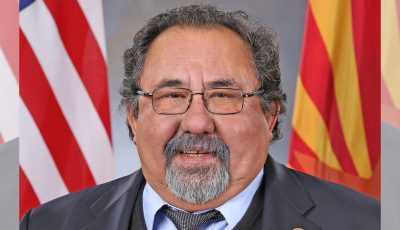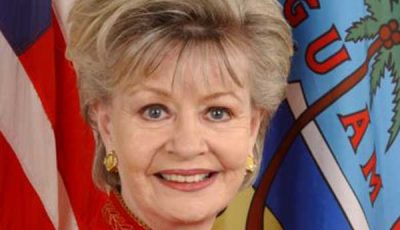AT HR 560 HEARING
Triple J’s Sablan gives biz’s side
As a representative of private company Triple J Enterprises, former public auditor Michael S. Sablan represented the perspective of businesses in last week’s House Natural Resources Committee hearing on a bill that seeks to resolve the CNMI’s labor and immigration issue.
In much of his testimony at the hearing on H.R. 560, which was introduced by Delegate Gregorio Kilili C. Sablan (Ind-MP), Sablan underscored the unique labor needs of the Commonwealth.
“Because of [the CNMI’s] small population and the isolated nature of our community from the mainland United States, we have historically relied on foreign workers to supplement the available local labor force in order to fill jobs in our public sector and in our largely tourism-based, service-oriented economy,” he said.
Sablan said his testimony reflects Triple J’s stand on the issues and aligns with the stance of the Northern Marianas Business Alliance Corp., the Saipan Chamber of Commerce, the Hotel Association of the Northern Mariana Islands, and the CNMI Chapter of the Society of Human Resource Managers, where their company is also a member of.
The NMBC, represented by president Alex Sablan, also spoke at the hearing.

Michael S. Sablan
Michael Sablan, who worked for eight years as public auditor for the CNMI government, said that some people in insular areas like the CNMI see the federal government as an authority that lacks the full understanding of their unique situations.
“In fact, some of the immigration issues decisions under review in this committee confirm that view. But today we can feel less inconsequential or misunderstood, when our own [delegate] now shares key responsibility for federal policy in the islands and can call a hearing to question these decisions and offer legislation to mitigate their impact on the insular areas.”
The committee hearing is one of the initiatives being made by Delegate Sablan, in providing solutions to the consequences that came about when the Consolidated Natural Resources Act of 2008 (Public Law 110-22), which extended federal immigration policies to the CNMI in 2009.
The hearing is also related to the decision of the U.S. Department of Homeland Security to remove the eligibility of citizens from the Philippines from the H-2B worker visa.
In his testimony, Triple J’s Sablan cited a U.S. Government Accountability Office report to the U.S. Congress that showed that the CNMI labor force, composed of 29,215 workers in 2016 with a 50-50 percentage between foreign and U.S. workers, dropped in 2006, with U.S. workers at 25 percent of the total labor force.
Sablan said the ratio of U.S. to foreign workers improved over the years. “It is also an improvement in the number of U.S. workers employed, which increased by nearly 2,000 over the 10-year period. Our experience at Triple J shows slightly better results. Ten years ago, 70 percent of our employees on Saipan were foreign. We have reversed that worker mix. Today, of our 280 Saipan employees, 70 percent are U.S. workers.”
“The remaining 30 percent are foreign workers, primarily nationals of the Philippines, who are difficult to replace with U.S. workers despite our best efforts to recruit from the U.S. mainland, the Freely Associated States in Micronesia, Puerto Rico, and Guam. These workers have unique skills, most of whom are so embedded in our businesses after decades of employment that they very difficult to replace.”
He added that Triple J will continue to emphasize U.S. workers. “Triple J has spent and will continue to spend considerable resources to recruit U.S. workers living in the CNMI, and try to attract those in the U.S. to move to our beautiful islands to fill the jobs needed in our businesses.”
“We are aware of other businesses [that] have invested in similar efforts as well. Despite our best collective efforts over the years, the unfortunate reality is that U.S. workers are difficult to recruit and are hesitant to relocate due to a number of factors.”
Sablan is also Triple J’s Finance and Administration vice president.
GAO report
In a report that he presented to the committee, David Gootnick, GAO International Affairs and Trade director, said the CNMI economy has recovered over the last four years after record lows more than a decade ago. “Growth and overall employment rose in 2016 and 2017, and the demand for CW permits exceeded for the first time. In 2017 to 2018, minimum wage more than doubled and then reached federal minimum wage.”
He said the CNMI’s 2018 gross domestic product would be impacted by Super Typhoon Yutu, which hit the islands in October. “The typhoon damaged homes and infrastructure, and the [Marianas Visitors Authority] data created significant but temporary decline in tourist arrivals.”
Gootnick added that the CNMI remains dependent on foreign labor even after 10 years after the CNRA was enacted. “GAO’s analysis of the CNMI tax data [showed] foreign workers [comprise] over half of total employment in 2016. In 2017, if all [foreign workers] were removed, the most likely result would be an economy 37 to 50 percent below the 2015 level.”
He said that DHS data also showed a decline in approved CW-1 permits from fiscal year 2017 (12,889) to 2018 (8,995), the number of H-2B visas, which often fill construction jobs, increased from 0 to 3,058. DHS, however, removed the Philippines from the list of countries eligible for the H-2B visa program. Nearly two-third of over 3,000 H-2B visa holders were in the construction trades.
“As you know the Workforce Act has established restriction on CW permits for construction and this appears to have caused large construction firms, amongst others, to move to H-2B visas.”
“DHS removal will make it more difficult in rebuilding after the typhoon and hotel construction,” added Gootnick.

























